Place: Venice
Time: 1457
Act 1
Scene 1: Outside the Council Chamber of the Doge's Palace
Members of the Council of Ten are waiting to enter the Council Chamber to try the case of Jacopo Foscari, the son of the Doge, who has been accused of murder. Upon the arrival of Loredano (Jacopo's sworn enemy) and his friend Barbarigo, they announce that the Doge has already entered the Chamber. They all enter the Chamber.
Having recently returned from exile, Jacopo is brought from the prison and expresses his love at seeing Venice again: Dal più remoto esilio / "From the most distant place of exile". When summoned to enter the Chamber and told that he can expect the Council to be merciful, Jacopo explodes in rage: Odio solo ed odio atroce / "Only hatred, cruel hatred, is locked within their breasts". He enters the Chamber.
Scene 2: A hall in the palace
Lucrezia Contarini, Jacopo's wife, learns from her ladies in waiting that the trial is proceeding in the Council Chamber. She quickly demands to see the Doge, Jacopo's father, but is told that she should pray for Jacopo's freedom. Angrily, she implores heaven to be merciful: Tu al cui sguardo onnipossente / "Thou beneath whose almighty glance all men rejoice or weep". Her friend Pisana enters in tears; she relays the news that Jacopo has been sentenced to further exile and this provokes another furious outburst from Lucrezia: La clemenza! s'aggiunge lo scherno! / "Their mercy? Now they add insult!". Pisana and the ladies beg her to trust in the mercy of God.
Scene 3: Outside the Council Chamber
The Council of Ten leaves the Chamber proclaiming that the evidence was clearly sufficient to convict Jacopo and that their actions will be seen as just and fair.
Scene 4: The Doge's private room
The Doge, Francesco Foscari, enters and wearily sits down. He expresses anguish at what has happened to his son but, as his father, feels there is nothing he can do to save him: O vecchio cor che batte / "Oh ancient heart that beats in my breast...". In tears, Lucrezia comes in and, when she tries to decry the actions of the Council, Francesco reminds her of his position as upholder of the law of Venice. Angrily, she denounces the law as being filled only with hatred and vengeance and demands that he return her husband to her: Tu pur lo sai che giudice / "You know it all too well". The scene ends with the Doge lamenting the limits of his power and the conflicts between being both ruler and father, while Lucrezia continues to demand his help. The sight of his tears gives her some hope.
Act 2
Scene 1: The state prison
Jacopo is alone in prison and laments his fate. He imagines that he is being attacked by Carmagnola, a famous condottiere (soldier) who was executed in Venice (Non maledirmi o prode / "Mighty warrior, do not curse me", and he faints. Still delirious, he finds Lucrezia is with him; she tells him of the Council's decision and the punishment of further exile. However, she tries to keep some hope alive and promises to join him in exile if need be.
The Doge arrives and declares that in spite of the fact that he was forced to act severely, he loves his son. Jacopo is comforted – Nel tuo paterno amplesso / "In a father's embrace my sorrow is stilled" – but is further disturbed by the Doge's claim that his duty must override his love of his son.
Loredano arrives to announce the official verdict and to prepare Jacopo for his departure. He is contemptuous of the pleas of the Foscari and orders his men to remove Jacopo from his cell. In a final trio, Jacopo, the Doge, and Lucrezia express their conflicting emotions and, as Jacopo is taken away, father and daughter-in-law leave together.
Scene 2: The Council Chamber
Loredano is adamant: there shall be no mercy and Lucrezia and her children will not be allowed to accompany Jacopo on his banishment. The Doge laments his inability to help, acting, as he must, in the role of Doge before that of father. Lucrezia enters with her two children. Jacopo embraces them while Lucrezia pleads with the councilors to no avail. Jacopo is taken away.
Act 3
Scene 1: The Piazetta of San Marco
While the people who have gathered express their joy at being together, Loredano and Barbarigo wait for the galley that will take Jacopo away to exile. He is led out, followed by his wife and Pisana, and expresses his feelings for Lucrezia: All'infelice veglio / "Unhappy woman, unhappy through me alone". Together, in a huge choral number, Jacopo, Lucrezia, Pisano, Barbarigo, Loredano, and the people of Venice each express their feelings. Jacopo begins: O padre, figli, sposa / "Father, children, wife, I bid you a last farewell", and the scene ends with Jacopo escorted onto the galley while Lucrezia faints in Pisana's arms.
Scene 2: The Doge's Palace
The grief-stricken Doge expresses his feelings – Egli ora parte! ("Now he is going!") – and pictures himself alone in his old age. Barbarigo brings him proof that his son was in fact innocent, while Lucrezia comes in to announce Jacopo's death: Più non vive... l'innocente / "He is no more... the innocent". As she leaves, a servant announces that the Council of Ten wish to meet with the Doge.
The Council, through its spokesman Loredano, announces that it has decided that Francesco, due to age, should give up his position as Doge. Angrily, he denounces their decision: Questa dunque è l'iniqua mercede / "This then is the unjust reward...". He asks for his daughter-in-law to be brought in and gradually lays down the trappings of his office. When Lucrezia enters and addresses him with the familiar title "Prince", he declares "Prince! That I was; now I am no longer." Just then, the bell of San Marco is heard announcing that a successor has been chosen. As it tolls a second time, Francesco recognizes that the end has come: Quel bronzo feral / "What fatal knell". As the bell tolls again, he dies; Loredano notes that "I am paid."
Place: Venice
Time: 1457
Act 1
Scene 1: Outside the Council Chamber of the Doge's Palace
Members of the Council of Ten are waiting to enter the Council Chamber to try the case of Jacopo Foscari, the son of the Doge, who has been accused of murder. Upon the arrival of Loredano (Jacopo's sworn enemy) and his friend Barbarigo, they announce that the Doge has already entered the Chamber. They all enter the Chamber.
Having recently returned from exile, Jacopo is brought from the prison and expresses his love at seeing Venice again: Dal più remoto esilio / "From the most distant place of exile". When summoned to enter the Chamber and told that he can expect the Council to be merciful, Jacopo explodes in rage: Odio solo ed odio atroce / "Only hatred, cruel hatred, is locked within their breasts". He enters the Chamber.
Scene 2: A hall in the palace
Lucrezia Contarini, Jacopo's wife, learns from her ladies in waiting that the trial is proceeding in the Council Chamber. She quickly demands to see the Doge, Jacopo's father, but is told that she should pray for Jacopo's freedom. Angrily, she implores heaven to be merciful: Tu al cui sguardo onnipossente / "Thou beneath whose almighty glance all men rejoice or weep". Her friend Pisana enters in tears; she relays the news that Jacopo has been sentenced to further exile and this provokes another furious outburst from Lucrezia: La clemenza! s'aggiunge lo scherno! / "Their mercy? Now they add insult!". Pisana and the ladies beg her to trust in the mercy of God.
Scene 3: Outside the Council Chamber
The Council of Ten leaves the Chamber proclaiming that the evidence was clearly sufficient to convict Jacopo and that their actions will be seen as just and fair.
Scene 4: The Doge's private room
The Doge, Francesco Foscari, enters and wearily sits down. He expresses anguish at what has happened to his son but, as his father, feels there is nothing he can do to save him: O vecchio cor che batte / "Oh ancient heart that beats in my breast...". In tears, Lucrezia comes in and, when she tries to decry the actions of the Council, Francesco reminds her of his position as upholder of the law of Venice. Angrily, she denounces the law as being filled only with hatred and vengeance and demands that he return her husband to her: Tu pur lo sai che giudice / "You know it all too well". The scene ends with the Doge lamenting the limits of his power and the conflicts between being both ruler and father, while Lucrezia continues to demand his help. The sight of his tears gives her some hope.
Act 2
Scene 1: The state prison
Jacopo is alone in prison and laments his fate. He imagines that he is being attacked by Carmagnola, a famous condottiere (soldier) who was executed in Venice (Non maledirmi o prode / "Mighty warrior, do not curse me", and he faints. Still delirious, he finds Lucrezia is with him; she tells him of the Council's decision and the punishment of further exile. However, she tries to keep some hope alive and promises to join him in exile if need be.
The Doge arrives and declares that in spite of the fact that he was forced to act severely, he loves his son. Jacopo is comforted – Nel tuo paterno amplesso / "In a father's embrace my sorrow is stilled" – but is further disturbed by the Doge's claim that his duty must override his love of his son.
Loredano arrives to announce the official verdict and to prepare Jacopo for his departure. He is contemptuous of the pleas of the Foscari and orders his men to remove Jacopo from his cell. In a final trio, Jacopo, the Doge, and Lucrezia express their conflicting emotions and, as Jacopo is taken away, father and daughter-in-law leave together.
Scene 2: The Council Chamber
Loredano is adamant: there shall be no mercy and Lucrezia and her children will not be allowed to accompany Jacopo on his banishment. The Doge laments his inability to help, acting, as he must, in the role of Doge before that of father. Lucrezia enters with her two children. Jacopo embraces them while Lucrezia pleads with the councilors to no avail. Jacopo is taken away.
Act 3
Scene 1: The Piazetta of San Marco
While the people who have gathered express their joy at being together, Loredano and Barbarigo wait for the galley that will take Jacopo away to exile. He is led out, followed by his wife and Pisana, and expresses his feelings for Lucrezia: All'infelice veglio / "Unhappy woman, unhappy through me alone". Together, in a huge choral number, Jacopo, Lucrezia, Pisana, Barbarigo, Loredano, and the people of Venice each express their feelings. Jacopo begins: O padre, figli, sposa / "Father, children, wife, I bid you a last farewell", and the scene ends with Jacopo escorted onto the galley while Lucrezia faints in Pisana's arms.
Scene 2: The Doge's Palace
The grief-stricken Doge expresses his feelings – Egli ora parte! ("Now he is going!") – and pictures himself alone in his old age. Barbarigo brings him proof that his son was in fact innocent, while Lucrezia comes in to announce Jacopo's death: Più non vive... l'innocente / "He is no more... the innocent". As she leaves, a servant announces that the Council of Ten wish to meet with the Doge.
The Council, through its spokesman Loredano, announces that it has decided that Francesco, due to age, should give up his position as Doge. Angrily, he denounces their decision: Questa dunque è l'iniqua mercede / "This then is the unjust reward...". He asks for his daughter-in-law to be brought in and gradually lays down the trappings of his office. When Lucrezia enters and addresses him with the familiar title "Prince", he declares "Prince! That I was; now I am no longer." Just then, the bell of San Marco is heard announcing that a successor has been chosen. As it tolls a second time, Francesco recognizes that the end has come: Quel bronzo feral / "What fatal knell". As the bell tolls again, he dies; Loredano notes that "I am paid."


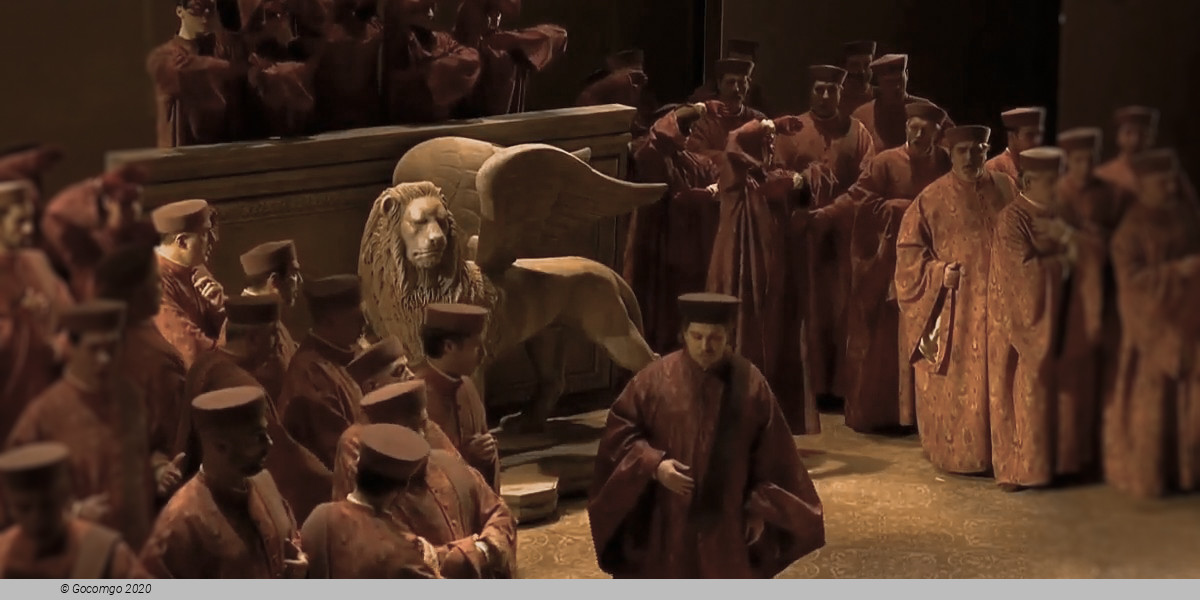
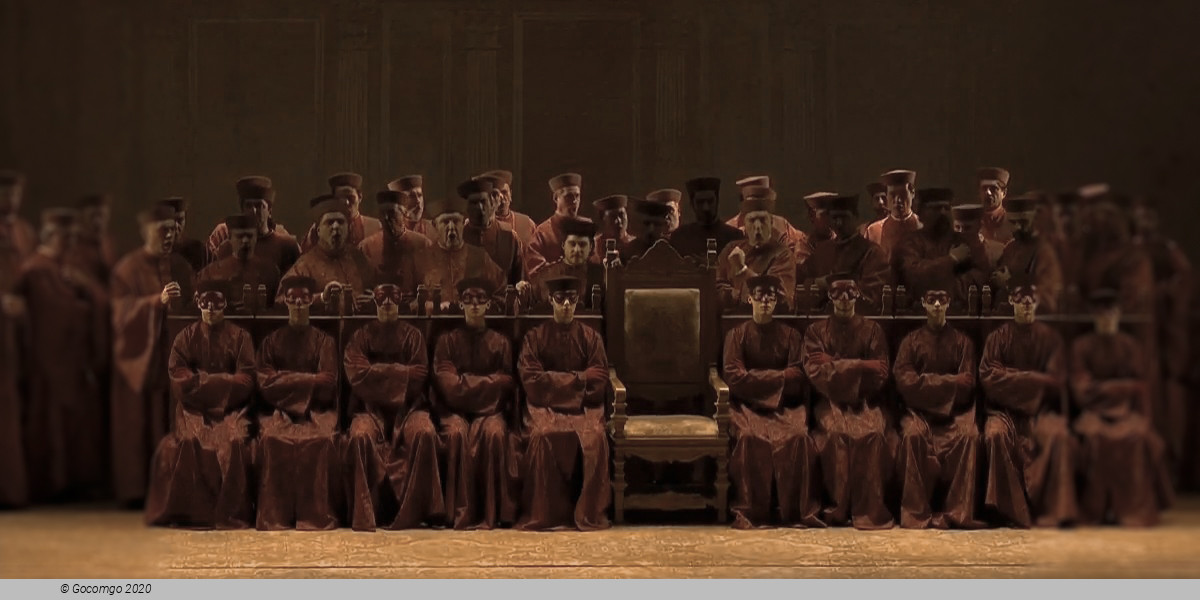
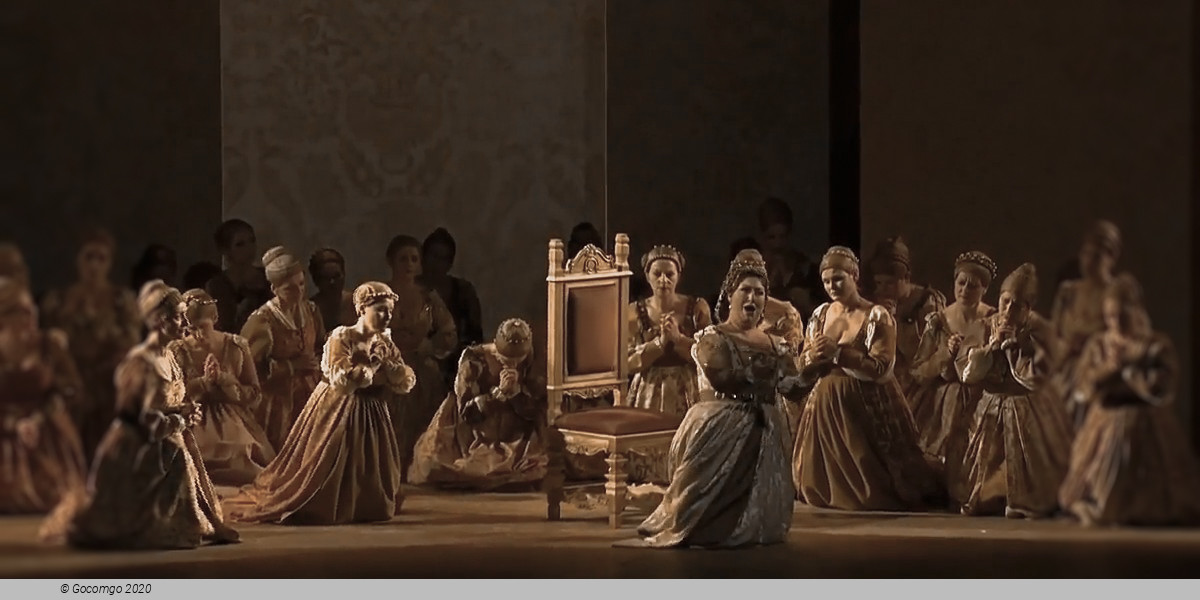
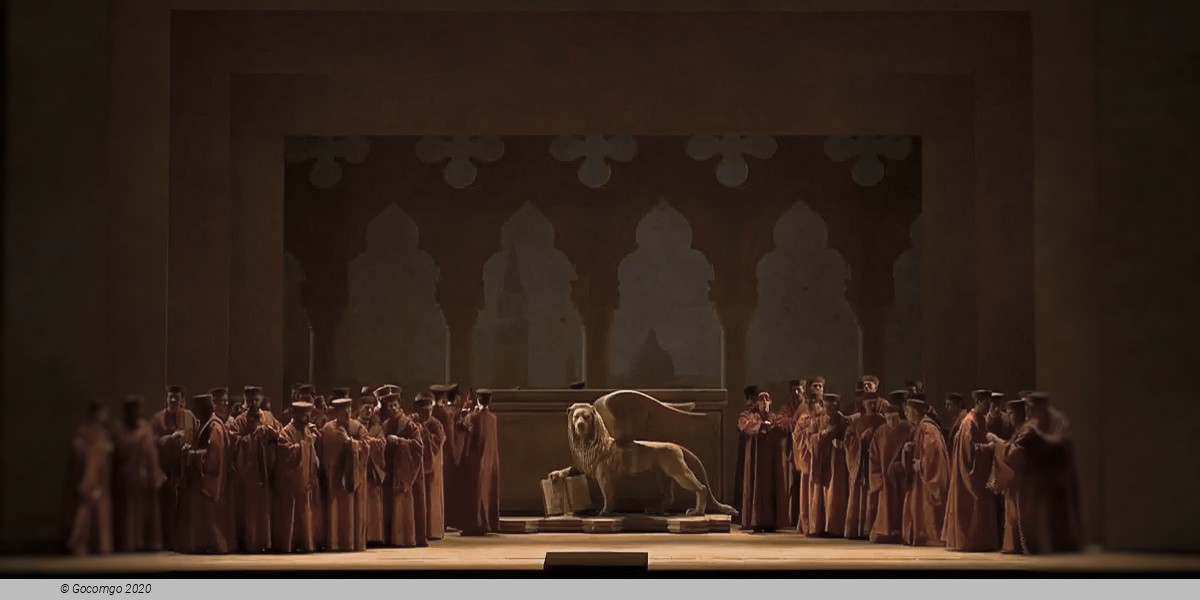
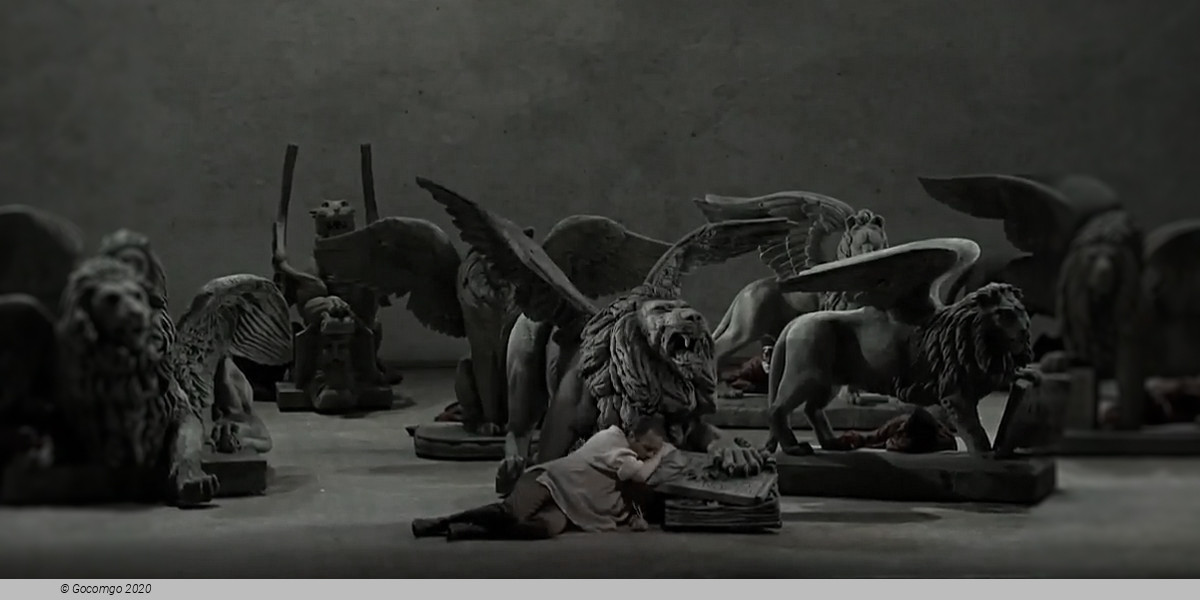
 Piazza Vittorio Gui, 1
Piazza Vittorio Gui, 1